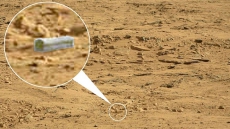TORONTO — Alex Tilley, the man who created one of Canada's most-prized outdoor wear companies, says it would be foolish to take the manufacturing of Tilley hats outside Canada.
But it's a decision that is ultimately out of his hands once he sells his company, which built its reputation partly on being homegrown.
"I cannot say 'Stay in Canada,'" the 77-year-old founder of Tilley Endurables said in a recent interview.
"But it would be foolish, in my opinion, to take the hat manufacturing outside of Canada."
Tilley planted a "For Sale" sign last week on the company he created over 30 years ago, sparking questions about whether a new buyer would alter the image of the brand, which helped shape the look of the modern adventurer.
Worn by Gulf War soldiers, British royalty, and even digested by an elephant, Tilley hats have endured through changes in fashion tastes and a shift by other companies to manufacture outside Canada.
Unlike other players in the garment industry, Tilley hasn't caved to pressures to ship production overseas. He built his company on the streets of Toronto, and the waters surrounding the city, and that's where he's chosen to keep its main operations over the years.
All of its Tilley-branded products are made in Canada, with production mainly in the Toronto area, and contractors based in Nova Scotia, Quebec and British Columbia. Only its socks are manufactured in the United States, said chief executive Mary-Coleen Shanahan.
The idea for the Tilley hat was born from Alex Tilley's failed search for a sailing hat that wouldn't blow off his head and wouldn't sink if it fell overboard.
In the early 1980s, he worked four days a week as a Toronto art dealer, renting and selling pieces to local businesses, a job that gave him heaps of time to spend on his sailboat.
He also spent hours searching for the perfect sailing hat, but always came up empty handed.
Instead of settling, Tilley put himself to work on a solution, which he quickly realized was something his friends in the sailing community also wanted to buy.
"I had a big advantage — I didn't know anything about making a hat, but I had the time to do it," he remembers.
Within months an early concept for the Tilley hat was created and the ball was rolling on his business. The hat debuted on the North American boat show circuit selling for $15.50 a pop, which meant he hardly turned a profit at first, he said.
"Finally, after a long time, I made enough money through the hat business to support myself to some degree," he said.
As the business gained popularity, retailers began to demand the Tilley brand for their shelves too.
By the late-1980s, the Tilley hat was a phenomenon in the outdoors industry, helped by its lifetime guarantee and the face of its founder, who appeared on posters for its clothing lines.
Alex grew into a celebrity with his customers, who would sometimes ask him to autograph their hats.
Throughout the years, Tilley has graced the heads of Prince Phillip, famed explorer Sir Edmund Hillary and Canadian soldiers during the Gulf War, who sometimes dyed the light coloured hat with coffee to make it more camouflaged.
One advertisement boasted how the material was tough enough to be eaten by an elephant three times and survive its digestive tract only to be worn once again.
Looking back at how the brand came to fruition, the company's founder says it's unlikely that he'd be able to build its reputation the same way in the current market.
"The competition is very stiff with China, so one would probably have to go offshore," he said.
Tilley said the reason he's selling the company comes down to one point: "It's time."
"I used to make clothing for people like myself," he said. "It's time to step aside and make sure the clothing it suitable for the younger people — the 40 year olds."
Asked how he'd like Tilley Endurables to be remembered after he sells it, his answer is simple.
"I'd like them to remember it was the best in the world at what we made, and that it was made in Canada," he said.





